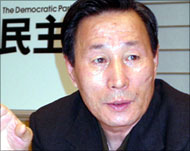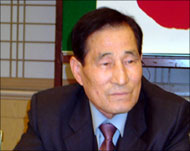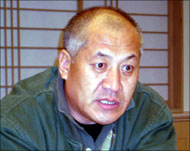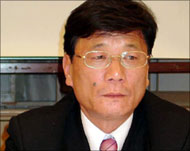Koreans risk their lives to speak out
Despite the defiant claims of national unity from Pyongyang, the people of North Korea have no faith in its ruler Kim Jong Il.

This, according to three South Korean fishermen who risked their lives to flee the regime three decades after being abducted.
By speaking out, however, the three continue to put their own lives at risk, as well as the lives of their wives, children and friends they had to leave behind in North Korea. But each of them say it is their duty to tell the world what is truly happening inside the world’s most secretive state.
With a nuclear weapons programme and a tightly closed society, some in the West argue it is also the most dangerous.
“The top ranks of the military believe very strongly in Kim and will protect the regime, but the ordinary people are saying things about him behind his back,” said Lee Jae Keyn.
His trawler was seized by a North Korean gunboat in April 1970 and he was forced to spend the next 30 years north of the 38th parallel.
Dissatisfied
“They’re very dissatisfied with the regime and, if the leadership believes its grip on power is beginning to slip and starts to turn on the people, they will definitely rise up and attack the military at the local level,” said Lee.
 |
|
Lee’s trawler was seized by a |
“There are 1.2 million people in the North Korean armed forces who will fight for Kim Jong Il, but the people won’t,” he said.
Lee, 65, recently visited Tokyo with Kim Byeong Do, 51, and Jin Jeng Pal, 63, both of whom were abducted by North Korean patrol boats in separate incidents more than a quarter of a century ago.
Lee and Kim escaped over the border into China in July 2000, while Jin managed to follow in their footsteps in February the following year.
“The purpose of our visit to Japan is to tell the world about the evil deeds of Kim Jong Il,” said Choi Sung Yong, who heads a group that helps South Koreans escape from the North.
Choi helped both Jin and Kim escape into China by sending volunteers across the Chinese border into North Korea to assist them.
All the volunteers are aware of their likely fate should they be detained, but believe the reunions they have witnessed between families that have not seen each other for three decades is worth the high risk.
North Koreans are disillusioned with a government that allowed hundreds of thousands of its 22 million people to starve to death in the mid-1990s, and they know that just one bad harvest will leave them in the same situation again. Even today, there is widespread hunger outside Pyongyang‘s power circles.
“Two million starving people is a clear threat to the regime,” said Lee. “The leaders believe the army can keep the people under control, and maybe they will have to because the people don’t believe in him any more.”
 |
|
Jin’s family remains in N Korea |
Danger
By speaking out, Lee is aware that friends, his wife’s family and everyone who knew him when he was forced to train spies before they were sent to South Korea could be in danger.
And while he managed to escape with his wife and son, swimming across the Tumen River, his fellow escapees were not so lucky.
Jin’s wife, two daughters and a son are still in North Korea, although his oldest son managed to escape last year, while Kim had to leave his wife and two sons behind.
“It will be a problem for my family because I managed to escape,” Kim said, slowly turning a glass ashtray in his hands. “They will have been having a very hard time since I left.”
According to human rights groups, people who criticise the regime in North Korea, along with families and friends, often end up in gulags.
“From the outside, it might seem that the people support the leadership, but in their hearts they don’t trust him at all and don’t believe that the country can continue like this for very long,” said Jin, who underwent six months of “socialist retraining” after his capture.
“It is my hope that something will happen so that we can be reunited as one nation as soon as possible; that would be the best thing for the people of North Korea.
 |
|
Choi helped Jin and Kim escape |
“I decided to leave when I had an opportunity because I felt that I was getting nearer to death and I wanted to return home to see my brothers before that day came,” he said.
Unfortunately, the trickle of information that leaves North Korea‘s tightly sealed borders suggests that his family is being closely watched by the authorities to prevent them from trying to follow him to freedom.
Henchmen
And even though they have physically left North Korea behind, the men still fear the long reach of Kim Jong Il’s henchmen.
“I’m still afraid that someone might come and take me back to North Korea,” says Lee. “I’ve received threatening phone calls in the middle of the night with people asking me why I’m still making a fuss.
“I always carry a knife in my pocket,” he added. “It’s not always convenient because it sets of the alarms at airports, for example, but I’ll continue to keep it with me out of fear because of all the things I’ve said about the regime.”
Lee may well have the most to fear of all the men; after arriving in Japan, he called for the international community to work together to ensure that Kim Jong Il goes on trial for crimes against humanity in the International Court of Justice.
 |
|
Kim fears for the safety of his |
Another statement that will not have endeared him to the regime would have been his claim to have seen Westerners in the mid-1970s who he believes were prisoners of war from the Korean War and had not been released by the North Koreans. The Korean War ended in 1953.
On other occasions, he said, “I heard from other released prisoners who saw American and British soldiers, who apparently participated in the Korean War, working in the mines.”
He also recalled another event, when a kidnapped student was sent to work in a vehicle factory and was imprisoned for a month after a fight with a supervisor.
“When he was released, he sold all his belongings in the market and bought a bottle of oil,” Lee said in testimony to a human rights group.
Example
“In front of the committee that was in charge of the factory, he shouted, ‘Who the hell are you bastards who kidnapped and detained me? You are the cause of my death!’ He poured the oil over himself and cried, ‘God save South Korea.’ This is just one example of what happened to people who were kidnapped by North Korea.”
“North Korea, a hell on Earth, is a place unparalleled anywhere else in the world,” he said.
|
“It’s a horrific way of life in North Korea” Lee Jae Keyn, |
Lee also worked for eight years at the Central Political School in Pyongyang, a training centre that prepared fanatical North Korean spies to carry out “terrorist activities” in the South, giving him a unique insight into the North’s covert operations against its neighbour.
But he dismisses the danger that he still faces with a shrug. “It’s a horrific way of life in North Korea,” he said.
Looking back, he can trace the moment that he decided it was worth risking his life to get out of North Korea to an incident in the late 1990s.
“I was at a school when a United Nations team paid a visit to make sure that food aid that was being sent to North Korea was actually getting to the people who needed it,” he said.
“Food that had been in storage was suddenly brought out and put in front of the hungry children – but they were told that under no circumstances could they eat it. As soon as the UN officials had gone, the food was taken away from them again. All the children started to cry.
“The North Korean people are starving – some have even had to resort to eating the flesh of other humans – but all the while Kim Jong Il enjoys gourmet meals,” he said. “Unless this regime is overthrown, there can never be peace on the Korean peninsula.”